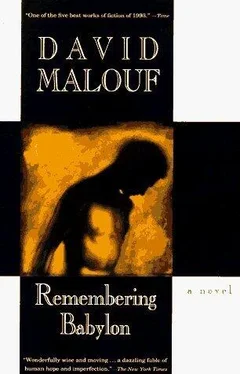He walked swiftly now over the charred earth and was himself crumbling. If he did not find the word soon that would let him enter here, there would be nothing left of him but a ghost of heat, a whiff as he passed of fallen ash.
A drop of moisture sizzled on his tongue: the word — he had found it. Water . Slow dribbles of rain began to fall. He was entering rain country. Soon the sky let down tangled streamers, and he was walking now in a known landscape; all the names of things, as he met them, even in their ashen form, shone on his breath, sprang up in their real lives about him, succulent green, soft paw and eyeball, muscle tense under fur.
He still carried in his pocket the sheets of paper on which they had written down his life. He took them out now. They were sodden. Rain had begun to wash the writing from them, the names, the events; their black magic now a watery sky-colour, the sooty grains sluicing away even as he watched; the paper turning pulpy, beginning to break up in his hands, dropping like soggy crumbs from his fingers into puddles where he left them, bits all disconnected … and my friens Billy an … pretty little black patch over … thunder Then … of every colour of …
THE SISTERS OF St Iona’s, Wynnum, were in a state of mild but pleasant ferment. The motor that emerged between the rusty palms of their drive, with its gleaming radiator grille and swoop of mudguards over spoked wheels, was a novelty. Almost beautiful in its way, it nosed its metal form, all purring, into the quiet of their walled retreat (the walls were ten feet high, spiked at the top with shards of glass from ginger beer and lemonade bottles), an impressive but dangerous reminder of a world they had set themselves apart from, though not entirely, and which had lately become very noisy and tragically interesting. The driver too, when he leapt out, was a novelty. That the occupant of the car was less so did not spoil the effect.
The world he belonged to was familiar. It was that of their fathers and brothers, the bushman in three-piece suit down for The Show. He had none of the up-to-date glamour of the driver, though he too, in fact, was an older man, and drew what they saw in him of the brute world that began at their gates from the animal sheen of his jacketed shoulders and the polish on his boots. He moved round in front of his machine and set his hand to chrome. The Minister’s shaggy head appeared. Manoeuvring his large frame out of the door, he shook himself as it were on the path.
He was here to see their own Sister Monica, who had, in these last weeks, done a quite extraordinary thing: she had got herself into the papers.
Some of her letters had been intercepted by the authorities and she had been suspected, briefly, of being a risk to security, perhaps a spy. It was nonsense of course and soon proved so; but some of the sisters had looked at her for a time with new eyes — the suspicion, after all, the mere possibility, was something — and one or two of them had been pleased to see her momentarily brought down. She was, to say no more, an infuriating woman, in no way humble; though they too, of course, were happy to have the cloud lifted from their little community, and the now famous correspondence declared innocuous, if not quite commonplace; unconnected, anyway, with news, battles, anger and the confirmation, unnecessary one might have thought, of dominion loyalty.
Still, they fluttered at the promise of yet another ministerial visitation. The man had not been cleared, or not in the public eye; and they rather enjoyed the hint, beyond his obvious plain looking and plain speaking, of something not quite trustworthy in him. It confirmed them in their distrust of the world, especially the active, overbearing male part of it. Some of them rushed about to see that the bannisters were without dust, rubbed their elbows on window-glass, peered at the tiles in the entry hall for heel-marks and scratches, as if he were here as an inspector of their devotion to the domestic virtues, to expose them as housewives largely failed. Discreetly, from upper windows, they watched Sister Monica, kilting her skirt up over her boots, go down the stone steps to greet him.
‘Lachlan,’ she said, and kissed him, first on one cheek then the other. ‘Hello,’ he replied, and glanced up under his brows at the watchers, who sprang back behind glass.
Even if no one could hear, he never quite knew how to address her in these moments when they were still in view. Later, she would be plain Janet. He could never quite come at ‘Sister’ or ‘Monica’.
‘Let’s get away from the gallery,’ she said.
‘Forty minutes, Wilson,’ he told the driver, who clicked his heels; then, very aware of the impression he was making above, moved across to the lawn and stood, back to the building, legs apart, with the sun on his shoulders, a thin trail of smoke rising before him, and myna birds pecking boldly round his boots.
The convent was an imposing structure of sandstone and timber with a double-storeyed verandah, open below but with rust-stained Venetians above. The roof was of colonial iron but the towers at either end, each with its set of louvred windows, and the columnated brick chimneys, gave it a baronial, almost Elizabethan look.
It had been built, with ballroom, billiard room and separate kitchen and servants’ quarters, for a local shipping magnate, whose fortune, before Federation put an end to that sort of thing, had been based on blackbirding for the sugar interests up north. His widow, an organiser, these days, of charity balls for the War effort, had deeded it to the sisters, as part of a bid for respectability in which the family name, in keeping with the new mood of expeditionary fervour and heroic self-sacrifice, would be relieved of the stain of Early Days in the South Seas, and the old ruffian who had been the scourge of all the nearby islands could become, with his white waistcoat and whiskers, a benign, grandfatherly figure, the very embodiment of the last great, if rather rough age of hobnailed visionaries. In this form his portrait dominated the staircase with its cedar newel posts and spindles, glaring down in regret, perhaps, of the children and grandchildren he had expected to fill the house when he first conceived it in the loneliness of nights up in the tropics, or in disapproval of the women in sensible boots who crossed and recrossed the stained-glass entry hall with their hands in their pockets, or, with skirts hauled up in the freedom of seclusion, swabbed its tiles with lye.
On his first visit, Lachlan Beattie had been entertained by the Mother Superior. Passing under the gaze of the old cut-throat (he had come across Duncan McGregor once or twice in earlier days, an unedifying experience), he had been led into a dark, overfurnished room to sip tea from a little ladylike cup, while Janet, impatiently, looked on.
The Mother Superior was a sensible woman, not inclined to panic at their moment of notoriety. She had allowed him to charm her, as she had him, but did not see him again. These days, free of formality, Janet led him round past the shabby side of the building towards the garden.
Things were ramshackle back here. There were tubs and a blackened furnace for washdays, and down a path of uneven bricks, two lopsided dunnies under a crown of pink antignonon. He imagined the sisters slopping out after dark under umbrellas in their loose boots, and the nightmen with cans on their shoulders, staggering to their wagons early enough on hot mornings not to cross one of the sisters on the path.
The garden, this afternoon, was steaming after a downpour. Snails were out, dragging their shells from under cassia and canna bushes. Sister Monica, Janet, very deliberately set her boots down in a little crunching dance this way and that in front of him. He felt, as he passed, the drag of a wet branch at his sleeve. Plumbago, all its long shoots drenched. He plucked a flower and, without thinking, put the stem between his teeth, finding the drop of sweetness. She turned to see what had stopped him.
Читать дальше












